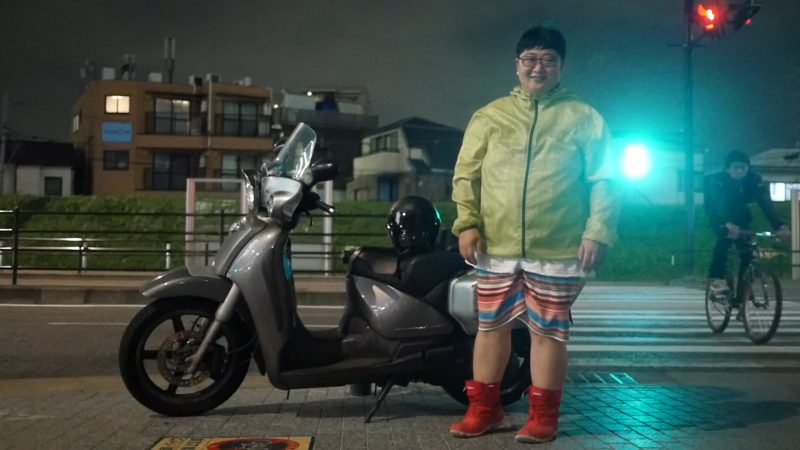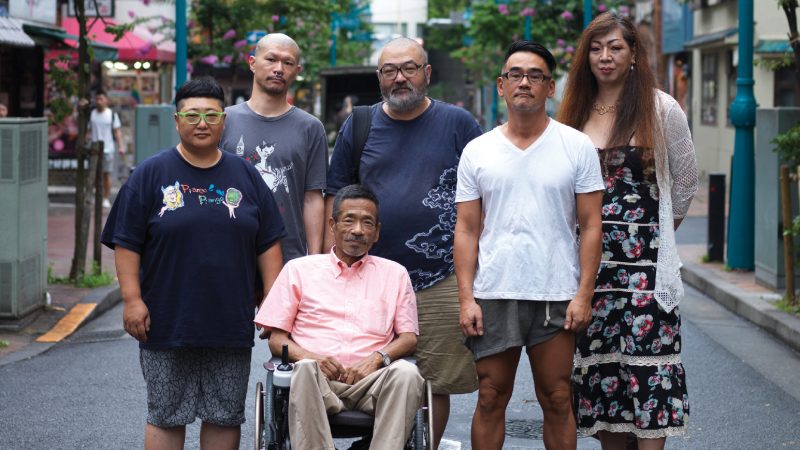“Queer Japan” Documentary of The Multi faceted LGBTQ Community in Japan
A documentary that explores the lives of Japan’s multifaceted LGBTQ+ culture has recently been released on streaming platforms. “Queer Japan,” a documentary by Canadian queer filmmaker, writer, and designer Graham Kolbeins, explores the lives artists, activists, trailblazers and just regular folks in Japan's LGBTQ+ culture.
“‘Queer Japan’ is about self-love, community, and resilience,” says director Graham Kolbeins in an interview with Global Voices. “It’s about the ambiguous nature of gender and sexuality, and the way language shapes our fluid understandings of these concepts.”
The documentary was first screened in July 2019, and was shown at film festivals around the world. “Queer Japan” features interviews with nearly three dozen members of Japan's LGTBQ+ community.
The film features a variety of individuals involved in art, activism, nightlife and politics in Japan, including a university instructor, a dentist, a drag queen and the parties she hosts for the LGTBQ+ community, the first openly transgender elected official in Japan Aya Kamikawa, and queer visual artist Nogi Sumiko.
Nogi Sumiko 1Nogi Sumiko. Image courtesy Graham Kolbeins, used with permission.“Queer Japan” also includes interviews with Gengoroh Tagame, the well-known gay erotic manga creator who has enjoyed mainstream success in Japan and around the world is also a featured interviewee.
“Gengoroh Tagame is not only a master of gay erotic art; he also created a renaissance of gay manga through the magazine he co-founded, G-men [an influential magazine aimed at gay men in Japan],” says Kolbeins. “Tagame's influences and references are eclectic, drawing on everything from the Marquis de Sade to Go Mishima and Tom of Finland.”
The documentary also includes another co-founder of G-Men magazine, writer, magazine editor and activist Hiroshi Hasegawa. Ever since Hasegawa was diagnosed as HIV-positive in 1992, he has lobbied for more and better treatment in Japan for the condition. Hasegawa has also played a prominent role in Japan campaigning to reduce the societal stigma who people living with HIV and AIDS.
Hiroshi Hasegawa at Tokyo Rainbow PrideHiroshi Hasegawa at Tokyo Rainbow Pride. Image courtesy Graham Kolbeins, used with permission.Kolbeins says the genesis for what would become the “Queer Japan” documentary dates back to nearly a decade ago and his love of Japanese manga.
“I was just a very big fan of the gay manga genre and perplexed as to why no publisher in North America had put out English-language translations of these artists’ work,” says Kolbeins. “At the time, I was writing for art and culture magazines, and decided to try conducting some interviews to spotlight gay manga artists.”
While there are no laws prohibiting consensual sexual acts between adults, there are no laws that address and prohibit discrimination against sexual orientation and gender identity in the workplace in Japan, and same-sex marriage has not yet been formally legalized.
Kolbeins says he decided to connect with Anne Ishii, a writer and translator, who currently serves as executive director of Asian Arts Initiative in Philadelphia.
“We started working together around 2012, when we traveled to Tokyo to work on the anthology we edited together, ‘Massive: Gay Erotic Manga and the Men Who Make It,'” says Kolbeins. “Soon after, we co-founded a fashion and publishing brand called Massive Goods [a fashion brand, publisher, and creative agency representing queer and feminist artists from Japan], continuing our collaborations with queer and feminist artists from Japan.”
Based on this work, Kolbeins and Ishii were the recipients of the 2016 Creative Artist Exchange Fellowship from the Japan-United States Friendship Commission (JUSFC), which allowed them to spend three months in Japan interviewing documentary subjects.
Queer Japan - PosterQueer Japan movie poster. Image courtesy Graham Kolbeins, used with permission.“After receiving the JUSFC’s fellowship, we raised the rest of the production budget for the documentary through crowdfunding,” says Kolbeins. “Because of the work Anne and I were doing at Massive, we were able to reach out to a community already interested in many of the film’s themes.”
The documentary ultimately took Kolbeins and producers Iida and Anne five years to complete before being released on the film festival circuit in 2019.
Kolbeins says “Queer Japan” producer, Hiromi Iida, also played a key role with the documentary by connecting him with Japan's LGTBQ+ community.
“I met Hiromi on Twitter, reaching out after watching several short documentaries she had made in Tokyo’s drag scene.
Hiromi Ishii introduced Kolbiens to community leaders such as Margarette, who operates iconic bookstore Okamalt and also hosts Department H, which is known as “one of Tokyo's most venerable fetish parties.”
Over the past decade, Kolbeins has been able to connect with an LGBTQ+ culture in Japan he describes as “multifaceted, robust and thriving.”
“At the same time, members of the Japanese queer community face plenty of legal obstacles, family pressure, and discrimination,” says Kolbeins. It’s a situation that leads many to stay selectively closeted, especially in workplace settings, Kolbeins says.
“Visibility and acceptance keep growing year after year, and as you can see in ‘Queer Japan,’ there are plenty of individuals living loud and proud in defiance of societal pressures,” says Kolbeins. “There is a growing spirit of solidarity and collective power in the community.”
The documentary is now available to watch in some regions on a variety of online rental streaming services. Kolbeins says there are hopes to release the film in Japanese cinemas in 2021, depending on pandemic conditions. Updates about the film are posted on the documentary's Twitter account, @queerjapan.
Global Voices
“‘Queer Japan’ is about self-love, community, and resilience,” says director Graham Kolbeins in an interview with Global Voices. “It’s about the ambiguous nature of gender and sexuality, and the way language shapes our fluid understandings of these concepts.”
The documentary was first screened in July 2019, and was shown at film festivals around the world. “Queer Japan” features interviews with nearly three dozen members of Japan's LGTBQ+ community.
The film features a variety of individuals involved in art, activism, nightlife and politics in Japan, including a university instructor, a dentist, a drag queen and the parties she hosts for the LGTBQ+ community, the first openly transgender elected official in Japan Aya Kamikawa, and queer visual artist Nogi Sumiko.
Nogi Sumiko 1Nogi Sumiko. Image courtesy Graham Kolbeins, used with permission.“Queer Japan” also includes interviews with Gengoroh Tagame, the well-known gay erotic manga creator who has enjoyed mainstream success in Japan and around the world is also a featured interviewee.
“Gengoroh Tagame is not only a master of gay erotic art; he also created a renaissance of gay manga through the magazine he co-founded, G-men [an influential magazine aimed at gay men in Japan],” says Kolbeins. “Tagame's influences and references are eclectic, drawing on everything from the Marquis de Sade to Go Mishima and Tom of Finland.”
The documentary also includes another co-founder of G-Men magazine, writer, magazine editor and activist Hiroshi Hasegawa. Ever since Hasegawa was diagnosed as HIV-positive in 1992, he has lobbied for more and better treatment in Japan for the condition. Hasegawa has also played a prominent role in Japan campaigning to reduce the societal stigma who people living with HIV and AIDS.
Hiroshi Hasegawa at Tokyo Rainbow PrideHiroshi Hasegawa at Tokyo Rainbow Pride. Image courtesy Graham Kolbeins, used with permission.Kolbeins says the genesis for what would become the “Queer Japan” documentary dates back to nearly a decade ago and his love of Japanese manga.
“I was just a very big fan of the gay manga genre and perplexed as to why no publisher in North America had put out English-language translations of these artists’ work,” says Kolbeins. “At the time, I was writing for art and culture magazines, and decided to try conducting some interviews to spotlight gay manga artists.”
While there are no laws prohibiting consensual sexual acts between adults, there are no laws that address and prohibit discrimination against sexual orientation and gender identity in the workplace in Japan, and same-sex marriage has not yet been formally legalized.
Kolbeins says he decided to connect with Anne Ishii, a writer and translator, who currently serves as executive director of Asian Arts Initiative in Philadelphia.
“We started working together around 2012, when we traveled to Tokyo to work on the anthology we edited together, ‘Massive: Gay Erotic Manga and the Men Who Make It,'” says Kolbeins. “Soon after, we co-founded a fashion and publishing brand called Massive Goods [a fashion brand, publisher, and creative agency representing queer and feminist artists from Japan], continuing our collaborations with queer and feminist artists from Japan.”
Based on this work, Kolbeins and Ishii were the recipients of the 2016 Creative Artist Exchange Fellowship from the Japan-United States Friendship Commission (JUSFC), which allowed them to spend three months in Japan interviewing documentary subjects.
Queer Japan - PosterQueer Japan movie poster. Image courtesy Graham Kolbeins, used with permission.“After receiving the JUSFC’s fellowship, we raised the rest of the production budget for the documentary through crowdfunding,” says Kolbeins. “Because of the work Anne and I were doing at Massive, we were able to reach out to a community already interested in many of the film’s themes.”
The documentary ultimately took Kolbeins and producers Iida and Anne five years to complete before being released on the film festival circuit in 2019.
Kolbeins says “Queer Japan” producer, Hiromi Iida, also played a key role with the documentary by connecting him with Japan's LGTBQ+ community.
“I met Hiromi on Twitter, reaching out after watching several short documentaries she had made in Tokyo’s drag scene.
Hiromi Ishii introduced Kolbiens to community leaders such as Margarette, who operates iconic bookstore Okamalt and also hosts Department H, which is known as “one of Tokyo's most venerable fetish parties.”
Over the past decade, Kolbeins has been able to connect with an LGBTQ+ culture in Japan he describes as “multifaceted, robust and thriving.”
“At the same time, members of the Japanese queer community face plenty of legal obstacles, family pressure, and discrimination,” says Kolbeins. It’s a situation that leads many to stay selectively closeted, especially in workplace settings, Kolbeins says.
“Visibility and acceptance keep growing year after year, and as you can see in ‘Queer Japan,’ there are plenty of individuals living loud and proud in defiance of societal pressures,” says Kolbeins. “There is a growing spirit of solidarity and collective power in the community.”
The documentary is now available to watch in some regions on a variety of online rental streaming services. Kolbeins says there are hopes to release the film in Japanese cinemas in 2021, depending on pandemic conditions. Updates about the film are posted on the documentary's Twitter account, @queerjapan.
Global Voices
Written byNevin Thompson




Comments